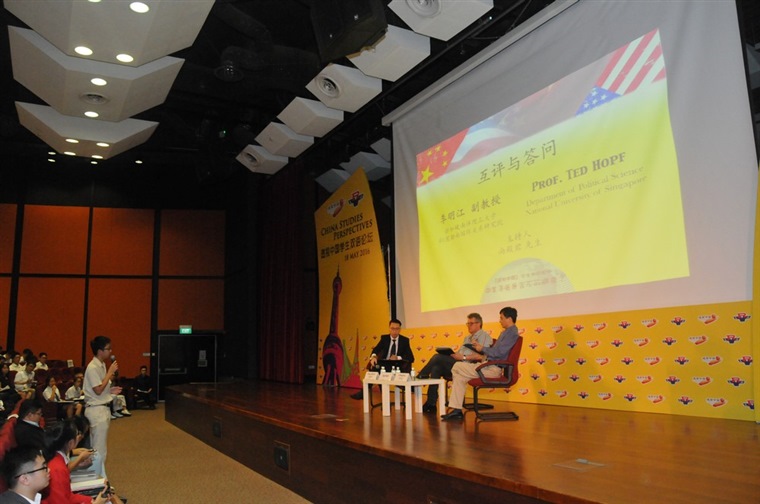Two professors shared their personal vantage points on US-China relations
On 18 May 2016, more than 650 students across various Junior Colleges, IP Schools, Polytechnics and Universities attended the Inaugural China Studies Perspectives jointly organised by Business China and River Valley High School.
Themed “US-China Relations: Is Conflict Inevitable?”, the bilingual student forum invited two prominent speakers, Provost Chair Professor Dr Ted Hopf from Department of Political Science, National University of Singapore and Associate Professor Dr Li Mingjiang from S. Rajaratnam School of International Studies (RSIS), Nanyang Technological University, to present Western and Eastern perspectives on the unique relations between the world’s top two superpowers.
At the start of the forum, a poll was conducted and 82% of the student audience felt that a conflict between the US and China is indeed inevitable. Assoc Prof Dr Li Mingjiang opined that the “conflict” discussed at the forum should be defined as “armed conflict”, and in this regard, he believed that both nations will in the short term maintain the status quo.
Assoc Prof Li also mentioned that the tensions between the US and China are still under both countries’ control although the South China Sea territorial dispute is worsening. In the long run, however, he believed that China will have to demonstrate superior political wisdom in order to ease the current situation and to prevent any undesired armed conflict.
Prof Ted Hopf, too, believed that the US and China will not engage in armed conflict in light of nuclear deterrence. On the future of US-China relations, Prof Hopf elaborated on the potential “good” and the possible “bad” relations. He presented statistics of collaboration and exchanges in the areas of trade, education and tourism, to iterate on the “good” relations; whilst citing examples of deferring ideologies in managing domestic affairs and international politics as potential flash points.
During the panel discussion, in response to the question of an ideal US-China relation, Prof Hopf hoped to see the US giving up its “imperial ambitions” and learn that cooperation with China and the other members of G20 should be the course of action. He also put forth the concept of “collective hegemony” where representatives from different countries have the same vision of collectively managing the global security and growing the global economy.
When asked whether cyber security issues would lead to a deterioration of US-China relations, Assoc Prof Li agreed that this is a longstanding problem but it will not upset the overall bilateral relations as it is ultimately a “war of words”. Moreover, in the past year, the two countries had been actively engaged in dialogues concerning cyber security. As such, Assoc Prof Li anticipated a positive outlook on this matter.
The same poll was conducted again to round off the forum and the results saw a significant drop – only 45% of the student audience felt that a conflict is inevitable. The majority of 55% believed that conflicts between the US and China can be avoided.
Ms Sun Xueling, CEO of Business China, in her closing remarks, urged students to hone their bilingual and bicultural skills to be future-proof. She said, “We make our living largely through trade and also economic cooperation. So, it is only with the understanding of the macro environment that we see ourselves in, then we are able to navigate these challenges and hopefully position ourselves in the future.”
The Forum was conducted in both English and Mandarin with simultaneous interpretation service provided for non-Chinese students.
The China Studies Perspective Series was conceptualised to provide a truly bilingual and bicultural platform for speakers with Western and Eastern perspectives to deliberate on China-related issues from their unique vantage points. The Forum seeks to promote understanding and appreciation of differing philosophical orientations, political views and cultural nuances in international engagements. Singapore has traditionally been situated at the crossroad of cultures. It is imperative that Singaporean students continue to augment our unique capability to code-switch and engage effectively across cultures, and to play a bigger role in global connectivity.

